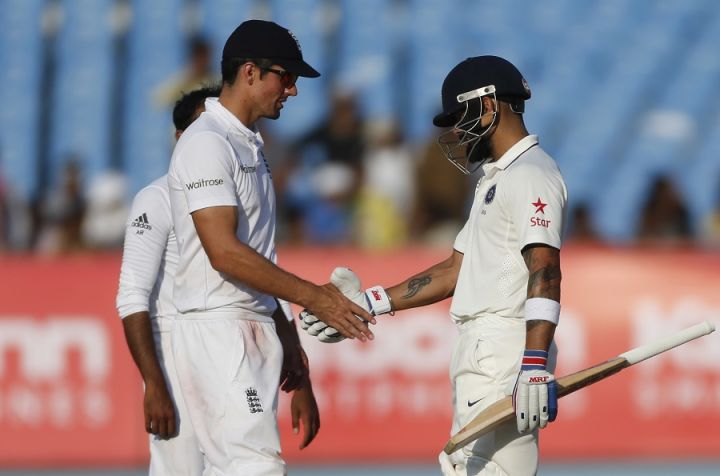Momentum, 'schmomentum' in Visakhapatnam
England were the better team in the drawn Rajkot Test, but the series is still 0-0 and India are still playing at home, on a Visakhapatnam pitch that looks likely to favour their strengths

Is momentum in cricket real?
Captains talk about it in earnest. Commentators go one step further, looking for the actual tipping point. It becomes part of the answer to why a player is in form and can even lay out why he isn't. It impacts a side's performance no matter the format. It even supersedes arguments such as conditions being different or that not all people tend to be affected by something in the same way.
Clearly, physics was never big enough to hold momentum all to itself and having transcended into the sporting arena, it has become a buzzword that nobody can escape.
In Rajkot, Virat Kohli said momentum "sort of defines if you have an advantage of a disadvantage as a team". By that logic, can England consider themselves as being on top going into the Visakhapatnam Test? They made more runs in Rajkot. They took more wickets. They even took the awards. Assuming momentum is as powerful as everyone says, perhaps.
Only, before the series began, India had crushed New Zealand, a team that seemed well-equipped to handle spin-friendly conditions. They hadn't lost a Test in over a year and the last time they did so at home was in 2012. If momentum was such an irresistible force, Kohli and his men shouldn't have been given the scare they were. Besides, they've insisted it wasn't a scare. That tense situations like being six down with 10 overs left on a fifth-day pitch are a learning experience. You can imagine how desperately disappointed they must have been as kids when school was out.
Momentum seems to have a tendency to vary with points of view as well. Alastair Cook is buoyed by the strength of England's performance in the opening Test of one of the toughest series of his career. Kohli believes he will get a track that is conducive to India's strengths so he is barely bothered about the events in Rajkot. Ask them who has the momentum, both men, would likely say they do. Makes sense. Not.
Look at the things that have changed. India have brought back their first-choice opener. KL Rahul comes into the second Test on the back of a first-class century which not only points to his form but importantly establishes that he has recovered well from a hamstring injury. On the other hand, England are worried over the availability of Chris Woakes, who has been among their best performing players since the start of their home summer.
Then there is the surface, which may start out better than hoped but would certainly deteriorate a lot quicker than the one at the Saurashtra Cricket Association Ground. R Ashwin and Ravindra Jadeja have exploited such conditions in the past. All they need is one to spin big. That combined with their ability to undercut the ball and make a few go straight has led many a batsmen to confusion. It is not an easily replicable skill. A spinner hoping for as little deviation as possible has to avoid the seam hitting the deck. Adil Rashid, Moeen Ali and Zafar Ansari may have made a fine start to the series, but can they match the Indians' tricks? None of them is experienced enough in this format to carry a bowling attack.
Finally, the batting. It is never black and white in touch conditions, which arguably, neither of these sides has had to deal with so far. Visakhapatnam - from day three onwards - appears set to remedy that. So defensive techniques need to be tight. Partnerships become crucial for any time a new batsman comes in, the likelihood of him getting out quickly may as well be a blaring red light on top of his head.
Even if someone is in form, he has to be mindful of the ways in which the bowler is targeting him. Just because he made a hundred in the last innings doesn't give him the right to pass go and collect 200 the next time. Monopoly rules sadly don't apply in cricket.
All these factors - the pitch, each team's plans, each individual's plans, the outcome of the toss - dispute the impact momentum can have across matches. Within a match then. Does one team pulling ahead immediately set them up in a match? Four years ago, in Ahmedabad, Cook made a resoundingly defiant 176 while following-on which forced the Indian bowlers to tire themselves out and may even have had a bearing on their potency in the next Test in Mumbai.
Hard work, skill, and just that little bit of chance, make up a cricket match. Momentum - whatever it is - is a far weaker influence.
Alagappan Muthu is a sub-editor at ESPNcricinfo
Read in App
Elevate your reading experience on ESPNcricinfo App.